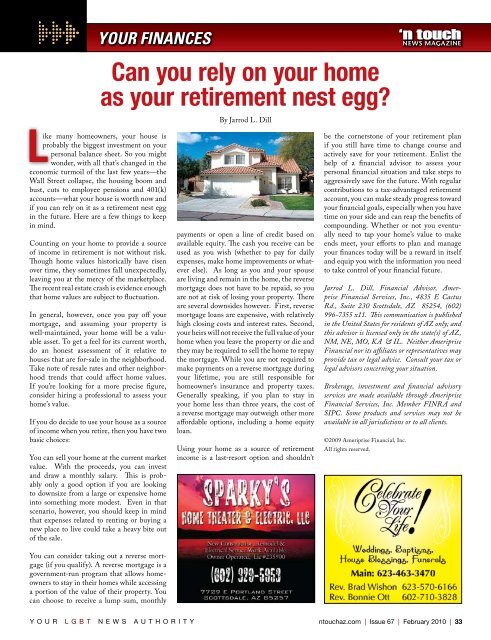'N Touch News Magazine Issue #67, February 2010
'N Touch News Magazine Issue #67, February 2010
'N Touch News Magazine Issue #67, February 2010
You also want an ePaper? Increase the reach of your titles
YUMPU automatically turns print PDFs into web optimized ePapers that Google loves.
your FiNANCeS<br />
Like many homeowners, your house is<br />
probably the biggest investment on your<br />
personal balance sheet. So you might<br />
wonder, with all that’s changed in the<br />
economic turmoil of the last few years—the<br />
Wall Street collapse, the housing boom and<br />
bust, cuts to employee pensions and 401(k)<br />
accounts—what your house is worth now and<br />
if you can rely on it as a retirement nest egg<br />
in the future. Here are a few things to keep<br />
in mind.<br />
Counting on your home to provide a source<br />
of income in retirement is not without risk.<br />
Though home values historically have risen<br />
over time, they sometimes fall unexpectedly,<br />
leaving you at the mercy of the marketplace.<br />
The recent real estate crash is evidence enough<br />
that home values are subject to fluctuation.<br />
In general, however, once you pay off your<br />
mortgage, and assuming your property is<br />
well-maintained, your home will be a valuable<br />
asset. To get a feel for its current worth,<br />
do an honest assessment of it relative to<br />
houses that are for-sale in the neighborhood.<br />
Take note of resale rates and other neighborhood<br />
trends that could affect home values.<br />
If you’re looking for a more precise figure,<br />
consider hiring a professional to assess your<br />
home’s value.<br />
If you do decide to use your house as a source<br />
of income when you retire, then you have two<br />
basic choices:<br />
You can sell your home at the current market<br />
value. With the proceeds, you can invest<br />
and draw a monthly salary. This is probably<br />
only a good option if you are looking<br />
to downsize from a large or expensive home<br />
into something more modest. Even in that<br />
scenario, however, you should keep in mind<br />
that expenses related to renting or buying a<br />
new place to live could take a heavy bite out<br />
of the sale.<br />
You can consider taking out a reverse mortgage<br />
(if you qualify). A reverse mortgage is a<br />
government-run program that allows homeowners<br />
to stay in their homes while accessing<br />
a portion of the value of their property. You<br />
can choose to receive a lump sum, monthly<br />
Can you rely on your home<br />
as your retirement nest egg?<br />
YoUr lGBt news AUthoritY<br />
By Jarrod L. Dill<br />
payments or open a line of credit based on<br />
available equity. The cash you receive can be<br />
used as you wish (whether to pay for daily<br />
expenses, make home improvements or whatever<br />
else). As long as you and your spouse<br />
are living and remain in the home, the reverse<br />
mortgage does not have to be repaid, so you<br />
are not at risk of losing your property. There<br />
are several downsides however. First, reverse<br />
mortgage loans are expensive, with relatively<br />
high closing costs and interest rates. Second,<br />
your heirs will not receive the full value of your<br />
home when you leave the property or die and<br />
they may be required to sell the home to repay<br />
the mortgage. While you are not required to<br />
make payments on a reverse mortgage during<br />
your lifetime, you are still responsible for<br />
homeowner’s insurance and property taxes.<br />
Generally speaking, if you plan to stay in<br />
your home less than three years, the cost of<br />
a reverse mortgage may outweigh other more<br />
affordable options, including a home equity<br />
loan.<br />
Using your home as a source of retirement<br />
income is a last-resort option and shouldn’t<br />
be the cornerstone of your retirement plan<br />
if you still have time to change course and<br />
actively save for your retirement. Enlist the<br />
help of a financial advisor to assess your<br />
personal financial situation and take steps to<br />
aggressively save for the future. With regular<br />
contributions to a tax-advantaged retirement<br />
account, you can make steady progress toward<br />
your financial goals, especially when you have<br />
time on your side and can reap the benefits of<br />
compounding. Whether or not you eventually<br />
need to tap your home’s value to make<br />
ends meet, your efforts to plan and manage<br />
your finances today will be a reward in itself<br />
and equip you with the information you need<br />
to take control of your financial future.<br />
Jarrod L. Dill, Financial Advisor, Amerprise<br />
Financial Services, Inc., 4835 E Cactus<br />
Rd., Suite 230 Scottsdale, AZ 85254, (602)<br />
996-7355 x11. This communication is published<br />
in the United States for residents of AZ only; and<br />
this advisor is licensed only in the state(s) of AZ,<br />
NM, NE, MO, KA & IL. Neither Ameriprise<br />
Financial nor its affiliates or representatives may<br />
provide tax or legal advice. Consult your tax or<br />
legal advisors concerning your situation.<br />
Brokerage, investment and financial advisory<br />
services are made available through Ameriprise<br />
Financial Services, Inc. Member FINRA and<br />
SIPC. Some products and services may not be<br />
available in all jurisdictions or to all clients.<br />
©2009 Ameriprise Financial, Inc.<br />
All rights reserved.<br />
ntouchaz.com | <strong>Issue</strong> 67 | <strong>February</strong> <strong>2010</strong> | 33





